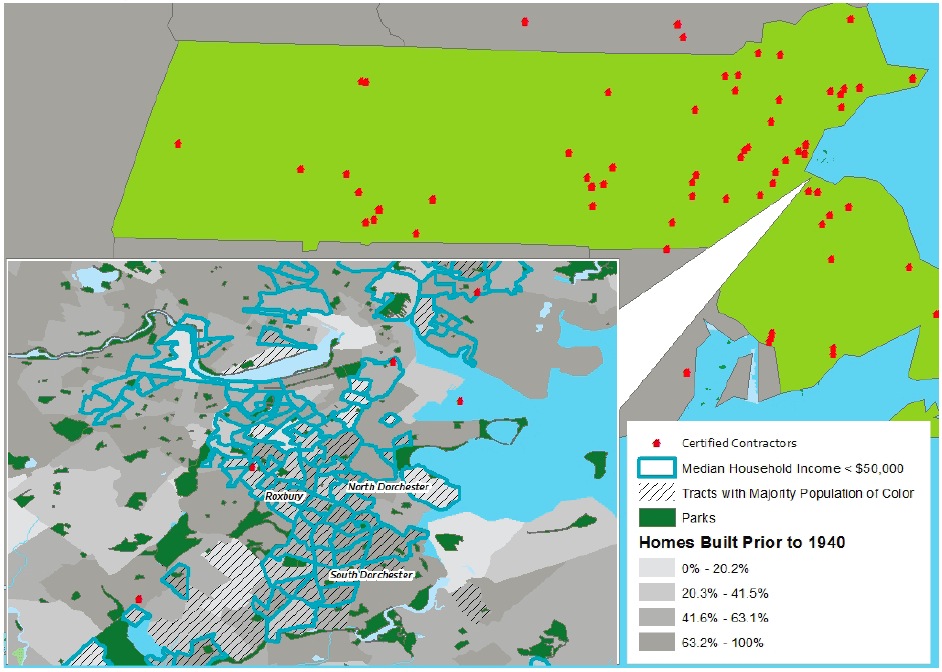CENTER FOR SOCIAL INCLUSION
INTRODUCTION
In 2008, Massachusetts took a bold step. It set an aggressive goal of cutting greenhouse gases by 25% in the next decade and over 80% by 2050. The Green Communities Act seeks to improve energy efficiency in communities and spur renewable energy development. The question remains, will people of color, 53% of the Boston population, be able to participate in this effort?
Communities of color have been environmental activists for decades. These are communities most often victimized by poor environmental planning, regulations, and decision‐making. In the last twenty years, communities of color in the Boston area have united and won a Boston‐wide plan to run buses on cleaner burning fuel, stopped a diesel fueled power plant from being located across from the only elementary school in the diverse Chelsea neighborhood, and ended illegal dumping of trash and toxic materials in abandoned lots throughout the communities of Roxbury and Dorchester.
Communities of color acting as environmental justice advocates have continued to work towards energy improvements by supporting community focused policy development. The Green Communities Act, a statewide policy passed in 2008, opened a new door to social entrepreneurship – applying entrepreneurial strategies to solving social problems for the public good. Social entrepreneurship is one of the ways communities of color have gone beyond fighting bad decisions to promoting positive solutions. Forming a Green Justice Coalition, environmental and economic advocates argued, “Small pockets of greening cannot meet this goal [of 80% efficiency]. To transform our energy system on this scale, all communities must have broad and deep engagement of residents and workers.”
With hopes of making this statement a reality, three Coalition members from Boston – Alternatives for Community and Environment (ACE), Chinese Progressive Association (CPA), and Boston Workers Alliance (BWA) – formed a partnership. The three non‐profits believed that communities of color would not be fully included in efficiency efforts because almost all the energy service companies responsible for implementing efficiency programs under the Act are not located where people of color live, such as the Roxbury or Dorchester neighborhoods (see: figure 1).
From an economic perspective, case study participants further noted that the lack of a local weatherization business may be a reason why many youth of color from the neighborhood, trained for weatherization, have difficulty finding work. Without a local weatherization business, young neighborhood residents who graduated from green training programs must go out of the area to find a job, a challenge for many in Roxbury and Dorchester, where 15% ‐ 35% of the population does not have access to a car and rely on transit for job opportunities.
To fill these gaps in environmental impact and access to green jobs, the three non‐profits are collaborating to create the Boston Energy Service Cooperative (BESC). BESC would retrofit and weatherize homes of low‐income residents. It would also be a community‐owned business employing local men and women and providing them with a democratic, one person/one vote decision‐making process. This need is significant; especially as unemployment for communities of color was double that of White communities prior to the recession.
It’s a compelling idea. And if it works, it could be a replicable model that contributes to job creation, civic engagement, and solving one of the world’s most pressing problems – global climate change.
BESC social entrepreneurs have made progress on development of the cooperative model and also face real challenges that policy innovation can help solve. By understanding these barriers and supporting their removal, we can make the hope of BESC a reality and create more opportunities for similar innovations.
Download full report (PDF): Community Innovation in Boston
About The Center for Social Inclusion
www.centerforsocialinclusion.org
The Center for Social Inclusion identifies causes of racial inequity growing out of public policy. Racial injustice is not only about individual attitudes. Our collective decisions shape where we invest our resources, develop relationships and build opportunities. Too often these decisions open a racial divide that undermines opportunity in communities of color. In the end, this injustice becomes a drag on the nation’s prosperity, and a critical barrier to our long-term health as a society. CSI develops ideas, supports grass roots leaders and moves public will to promote structural transformation through public policy, sowing seeds of racial, gender and class equity for all.
Tags: Boston, Center for Social Inclusion, CSI, Green Communities Act, Massachusetts







 RSS Feed
RSS Feed